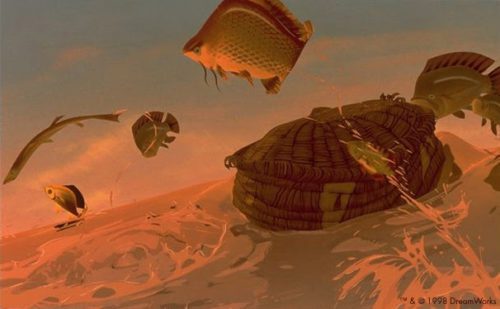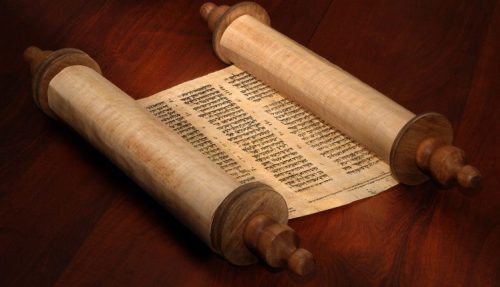
She is one of the most unexpected heroes of the Hebrew Bible. Without her, Moses might not have lived. The whole story of the exodus would have been different. Yet she was not an Israelite. She had nothing to gain, and everything to lose, by her courage. Yet she seems to have had no doubt, experienced no misgivings, made no hesitation. If it was Pharaoh who afflicted the children of Israel, it was another member of his own family who saved the decisive vestige of hope: Pharaoh’s daughter. Recall the context. Pharaoh had decreed death for every male Israelite child. Yocheved, Amram’s wife, had a baby boy. For three months she was able to conceal his existence, but no longer. Fearing his certain death if she kept him, she set him afloat on the Nile in a basket, hoping against hope that someone might see him and take pity on him. This is what follows:
Pharaoh’s daughter went to bathe in the Nile, while her maids walked along the Nile’s edge. She saw the box in the reeds and sent her slave-girl to fetch it. Opening it, she saw the boy. The child began to cry, and she had pity on it. “This is one of the Hebrew boys,” she said (Ex. 2:6).
Note the sequence. First she sees that it is a child and has pity on it. A natural, human, compassionate reaction. Only then does it dawn on her who the child must be. Who else would abandon a child? She remembers her father’s decree against the Hebrews. Instantly the situation has changed. To save the baby would mean disobeying the royal command. That would be serious enough for an ordinary Egyptian; doubly so for a member of the royal family.[1]
Nor is she alone when the event happens. Her maids are with her; her slave-girl is standing beside her. She must face the risk that one of them, in a fit of pique, or even mere gossip, will tell someone about it. Rumours flourish in royal courts. Yet she does not shift her ground. She does not tell one of her servants to take the baby and hide it with a family far away. She has the courage of her compassion. She does not flinch. Now something extraordinary happens:
The [child’s] sister said to Pharaoh’s daughter, “Shall I go and call a Hebrew woman to nurse the child for you?” “Go,” replied Pharaoh’s daughter. The young girl went and got the child’s own mother. “Take this child and nurse it,” said Pharaoh’s daughter. “I will pay you a fee.” The woman took the child and nursed it. (Ex. 2:7–9)
The simplicity with which this is narrated conceals the astonishing nature of this encounter. First, how does a child – not just a child, but a member of a persecuted people – have the audacity to address a princess? There is no elaborate preamble, no “Your royal highness” or any other formality of the kind we are familiar with elsewhere in biblical narrative. They seem to speak as equals.
Equally pointed are the words left unsaid. “You know and I know,” Moses’ sister implies, “who this child is; it is my baby brother.” She proposes a plan brilliant in its simplicity. If the real mother is able to keep the child in her home to nurse him, we both minimise the danger. You will not have to explain to the court how this child has suddenly appeared.
We will be spared the risk of bringing him up: we can say the child is not a Hebrew, and that the mother is not the mother but only a nurse. Miriam’s ingenuity is matched by Pharaoh’s daughter’s instant agreement. She knows; she understands; she gives her consent.
Then comes the final surprise:
When the child matured, [his mother] brought him to Pharaoh’s daughter. She adopted him as her own son, and named him Moses. “I bore him from the water,” she said. (Ex. 2:10)
Pharaoh’s daughter did not simply have a moment’s compassion. She has not forgotten the child. Nor has the passage of time diminished her sense of responsibility. Not only does she remain committed to his welfare; she adopts the riskiest of strategies. She will adopt him and bring him up as her own son.[2] This is courage of a high order.
Yet the single most surprising detail comes in the last sentence. In the Torah, it is parents who give a child its name, and in the case of a special individual, God Himself. It is God who gives the name Isaac to the first Jewish child; God’s angel who gives Jacob the name Israel; God who changes the names of Abram and Sarai to Abraham and Sarah. We have already encountered one adoptive name – Tzafenat Pa’nea? – the name by which Joseph was known in Egypt; yet Joseph remains Joseph. How surpassingly strange that the hero of the exodus, greatest of all the prophets, should bear not the name Amram and Yocheved have undoubtedly used thus far, but the one given to him by his adoptive mother, an Egyptian princess. A Midrash draws our attention to the fact:
This is the reward for those who do kindness. Although Moses had many names, the only one by which he is known in the whole Torah is the one given to him by the daughter of Pharaoh. Even the Holy One, blessed be He, did not call him by any other name.[3]
Indeed Moshe – Meses – is an Egyptian name, meaning “child,” as in Ramses (which means child of Ra; Ra was the greatest of the Egyptian gods).
Who then was Pharaoh’s daughter? Nowhere is she explicitly named. However the First Book of Chronicles (4:18) mentions a daughter of Pharaoh, named Bitya, and it was she the sages identified as the woman who saved Moses. The name Bitya (sometimes rendered as Batya) means “the daughter of God.” From this, the sages drew one of their most striking lessons: “The Holy One, blessed be He, said to her: ‘Moses was not your son, yet you called him your son. You are not My daughter, but I shall call you My daughter.’”[4] They added that she was one of the few people (tradition enumerates nine) who were so righteous that they entered paradise in their lifetime.[5]
Instead of “Pharaoh’s daughter” read “Hitler’s daughter” or “Stalin’s daughter” and we see what is at stake. Tyranny cannot destroy humanity. Moral courage can sometimes be found in the heart of darkness. That the Torah itself tells the story the way it does has enormous implications. It means that when it comes to people, we must never generalise, never stereotype. The Egyptians were not all evil: even from Pharaoh himself a heroine was born. Nothing could signal more powerfully that the Torah is not an ethnocentric text; that we must recognise virtue wherever we find it, even among our enemies; and that the basic core of human values – humanity, compassion, courage – is truly universal. Holiness may not be; goodness is.
Outside Yad Vashem, the Holocaust Memorial in Jerusalem, is an avenue dedicated to righteous gentiles. Pharaoh’s daughter is a supreme symbol of what they did and what they were. I, for one, am profoundly moved by that encounter on the banks of the Nile between an Egyptian princess and a young Israelite child, Moses’ sister Miriam. The contrast between them – in terms of age, culture, status and power – could not be greater. Yet their deep humanity bridges all the differences, all the distance. Two heroines. May they inspire us.
Shabbat shalom
1] “Seeing that she [Pharaoh’s daughter] wanted to save Moses, they [her handmaids] said to her, ‘Mistress, it is customary that when a king of flesh and blood issues a decree, even if the whole world does not fulfil it, at least his children and the members of his household fulfill it. Yet you transgress your father’s decree!’” (Sotah 12b)
2] On the adoption of a foundling in the ancient world, see Nahum Sarna, Exploring Exodus (New York: Schocken, 1986), 31–32
3] Shemot Rabbah 1:26
4] Vayikra Rabbah 1:3
5] Derekh Eretz Zuta 1
An international religious leader, philosopher, award-winning author and respected moral voice, Rabbi Lord Jonathan Sacks was awarded the 2016 Templeton Prize in recognition of his “exceptional contributions to affirming life’s spiritual dimension.” Described by H.R.H. The Prince of Wales as “a light unto this nation” and by former British Prime Minister Tony Blair as “an intellectual giant”, Rabbi Sacks is a frequent and sought-after contributor to radio, television and the press both in Britain and around the world.
Since stepping down as the Chief Rabbi of the United Hebrew Congregations of the Commonwealth – a position he served for 22 years between 1991 and 2013 – Rabbi Sacks has held a number of professorships at several academic institutions including Yeshiva University and King’s College London. In addition to his writing and lecturing, he currently serves as the Ingeborg and Ira Rennert Global Distinguished Professor at New York University. Rabbi Sacks has been awarded 17 honorary doctorates including a Doctor of Divinity conferred to mark his first ten years in office as Chief Rabbi, by the then Archbishop of Canterbury, Lord Carey.
Rabbi Sacks is the author of over 30 books. Among them, Rabbi Sacks has published a new English translation and commentary for the Koren Sacks Siddur, the first new Orthodox siddur in a generation, as well as powerful commentaries for the Rosh HaShana, Yom Kippur, Pesach, Shavuot and Sukkot Machzorim. His most recent work, Not in God’s Name: Confronting Religious Violence was awarded a 2015 National Jewish Book Award in America and was a top ten Sunday Times bestseller in the UK. Past works include: The Great Partnership: God, Science and the Search for Meaning; The Dignity of Difference: How to Avoid the Clash of Civilizations, winner of the Grawemeyer Prize for Religion in 2004 for its success in defining a framework for interfaith dialogue between people of all faith and of none; To Heal a Fractured World: The Ethics of Responsibility; and A Letter in the Scroll: On Being Jewish, winner of a National Jewish Book Awards in 2000. His Covenant & Conversationcommentaries on the weekly Torah portion are read in Jewish communities around the world.
In recognition of his work, Rabbi Sacks has received, among others, the Jerusalem Prize in 1995 for his contribution to diaspora Jewish life, The Ladislaus Laszt Ecumenical and Social Concern Award from Ben Gurion University in Israel in 2011, The Guardian of Zion Award from the Ingeborg Rennert Center for Jerusalem Studies at Bar-Ilan University in 2014, and The Katz Award in recognition of his contribution to the practical analysis and application of Halakha in modern life in Israel in 2014. He was named as The Becket Fund’s 2014 Canterbury Medalist for his role in the defence of religious liberty in the public square; won a Bradley Prize in 2016 in recognition of being “a leading moral voice in today’s world”; and in 2017, he was awarded the Irving Kristol Award from the American Enterprise Institute for his “remarkable contributions to philosophy, religion, and interfaith discourse… as one of the world’s greatest living public intellectuals.” In 2018, he was given the Lifetime Achievement Award by The London Jewish News in recognition of his services to the Jewish world and wider society.
Rabbi Sacks was knighted by Her Majesty The Queen in 2005 and made a Life Peer, taking his seat in the House of Lords in October 2009. Born in 1948 in London, he has been married to Elaine since 1970. They have three children and several grandchildren.
